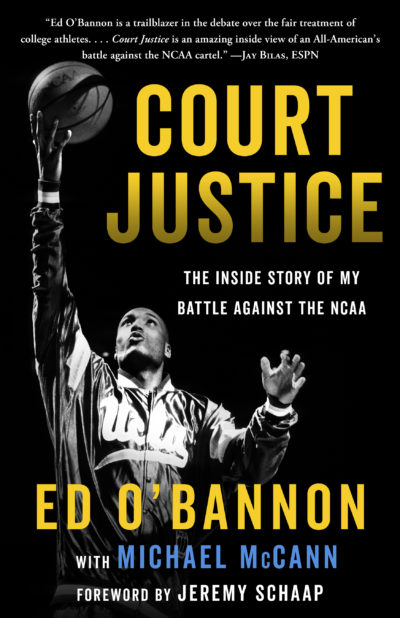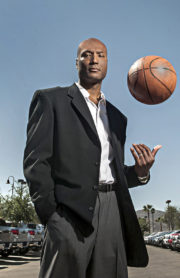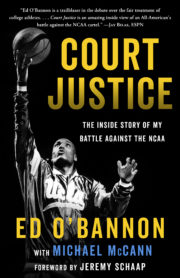
Read an excerpt from Court Justice
The Inside Story of My Battle Against the NCAA
 Ed O’Bannon with Michael McCann
Ed O’Bannon with Michael McCann
When I looked at Rosa from the stand, I looked into someone who not only understood the cause but who also embraced it. This inspired me to make her proud. I then looked at the Vaccaros. They were the heart of this case, the heart of correcting an injustice. They could have enjoyed their retirement in Santa Monica and lived the good life. Instead, they chose to fight. I may have been the only one on the witness stand, but in a way Rosa, the Vaccaros, and college athletes everywhere were up there too.
Michael conducted the first part of the questioning—the“direct.” I knew the kinds of questions he was going to ask because we had discussed them during our mock trial. Those questions focused on how sports came before school while I was a student at UCLA. I detailed how I was encouraged to take relatively easy courses so that I could maximize my development as a basketball player. “Don’t take classes that are too hard or that will pull you out of practice,” I was often told back then. The truth is, I was an athlete masquerading as a college student. I basically did the minimum to make sure I kept my academic eligibility so I could continue to play. And I told the court as much.
Now, these remarks were obviously not about video games and television rebroadcasts and how I appeared in them without consent or compensation. But they were nonetheless relevant to our case because one of the NCAA’s main defenses was that compensation for college athletes would corrupt those athletes’ academic experience. My testimony showed that the academic experience for top Division I college athletes was already a sham.
After Michael finished asking me questions, Glenn Pomerantz, the NCAA’s lead counsel, got up from the defendant’s table and began cross-examination.
I knew I was in for a battle.
I didn’t like him, first and foremost. But that’s not a dig. Pomerantz did his job very well in making me not like him, so in a way I say that as a compliment. And like the other NCAA attorneys, he was polite and had an air of superiority. He seemed to talk down to me and he didn’t appear too concerned about what I might say. It reminded me of my basketball days when we played teams that we weren’t supposed to beat. Sometimes they didn’t warm up as hard and kind of looked at us like we were a joke. It’s that same feeling you get when the person you’re speaking with views you as beneath them. It is an unsettling feeling, and I felt it while Pomerantz spoke to me.
Pomerantz was also slick. He tried to make me sound hypocritical based on the deposition I had given in 2011. As I mentioned earlier in this book, I gave a vague response to a vague question about whether college athletes should be paid while in school, and that was before our case expanded to include current college athletes. And all that entire exchange stemmed from remarks I’m quoted as saying in a Las Vegas Sunarticle published in 2010.
Pomerantz clearly thought he had me. He did not. I told him college athletes should be paid given the amount of money they generate for schools. It’s not a hard concept.
The one question that caught me off guard was his last. After grilling me for over an hour, Pomerantz paused as if he had this momentous point. “Mr. O’Bannon,” Pomerantz inquired, “should high school athletes be paid if their games are on television?” I responded yes, so long as those broadcasts are generating revenue for their schools. Then, in a self-righteous tone, Pomerantz asked, “What about Little League players appearing on TV?” I thought about it and said, “Yes, so long as they are generating revenue.”
Pomerantz smirked at me like I had said something stupid. Even the people in the gallery shuffled with an uneasy sigh. I wasn’t deterred, though. I continued in my testimony by saying that twelve-year-old actors get paid when they appear on television and generate revenue. It’s not about being too young to get paid. Still, I could almost feel the whole courtroom look at me. I could see everyone’s faces. If those faces could talk during the middle of a witness’s testimony, they’d be saying, Dude, did you seriously just say that Little Leaguers should get paid?
I wish I could have a do-over on that answer, but not because I’d change the thrust of my answer. Yes, Little Leaguers should be paid. But I would want to explain my answer more fully. “Pay” to Little Leaguers doesn’t necessarily mean a paycheck. It could mean reimbursement to the parents for travel costs, hotel room bills, and car mileage. It could mean better uniforms and equipment for the kids and improved and safer fields where they play. “Pay” could come in many forms so long as it gives back to the players’ communities.
I would have also mentioned that Pomerantz’s comparing the NCAA to Little League was misleading, at best. The NCAA is a cartel of more than 1,200 members that agree to rules that prevent athletes—the vast majority of whom are eighteen or older—from receiving compensation. Little League Baseball is just one company that sets rules for kids aged four to sixteen. They are structurally different and have different goals.
By the way, what happened two months after my trial? Mo’ne Davis dominated the Little League World Series and became a national sensation. She was the first girl to pitch a shutout in the history of the Little League World Series. She was on ESPN throwing heat. Everybody loved her—she’s talented and charismatic. Sports Illustrated put her on its cover.
Davis also signed an endorsement deal with Chevrolet, even though she was only thirteen years old and wouldn’t be driving for a few years. As part of that deal, she appeared in a Spike Lee–directed spot where she’s shown excelling at different sports—including swishing a half-court shot on a basketball court—and while pitching she declares, “I throw seventy miles per hour. That’s throwing like a girl!” Then the ad shows the text, Chevrolet celebrates Mo’ne Davis and those who remind us that anything is possible.
I said to myself, Here is a Little Leaguer who signs an endorsement deal with a car company. And I got courtroom grief for wanting Little Leaguers’ parents to get gas money!
And what about the NCAA’s position on Davis? Mark Emmert told media that she could take endorsement money related to baseball because baseball likely wouldn’t be the sport she’d play in college. He compared Davis to Danny Ainge, who in the early ’80s maintained his eligibility to play college basketball while pursuing a professional baseball career with the Toronto Blue Jays.
I’m glad the NCAA didn’t try to stop Davis from endorsement deals. But why does it stop those deals with any athletes? What is the point? It’s obvious that young athletes can be extremely marketable. Why not let them be?
Judge Wilken dismissed me from the witness stand. Rosa was completely on my mind as I began to get up and walk back, just like she was on my mind for 90 percent of the testimony. Another 5 percent was on my kids and the remaining 5 percent was on trying to get back to my seat without passing out. That would have been embarrassing!
I felt genuinely relieved getting into my seat at our side’s table, and was determined to show a poker face and just sit there. But my mind was on my performance. How did I do? Was I good or bad? Did anything I say make a difference? All I could do was sit and watch on.
That first break came when Judge Wilken called for the lunch recess. I didn’t get to speak with Rosa first. Instead, Michael first came over to me and kindly said, “You were great, Ed. You spoke clearly and decisively. And you were authentic up there—at the end of the day, that’s what matters most.” Sathya, who was immediately behind Michael, then reached over and put his right hand on my shoulder. He smiled. “You nailed it, Ed.”
Only after we walked away from the plaintiff’s table and toward the rows where the public was seated did I get to talk to Rosa and the Vaccaros. They whispered kind things in my ear. I felt pumped, like I had just scored twenty points and pulled down a dozen rebounds.
That night Rosa and I had dinner in the Marriott’s Iron and Oak Restaurant. There was a TV and ESPN was on it. At the bottom of the broadcast was a ticker where my trial was mentioned on a loop. I took it in for a moment. This trial has really started. We really had the NCAA in the hot seat. Man, did it feel good.
Now, I knew tweets were being sent and articles were being written about my testimony. I could have easily gone online and read the coverage.
But I didn’t.
I wasn’t going to get caught up in it. I had said my piece and that was all.
***
To find out more click the link below
Court Justice: The Inside Story of My Battle Against the NCAA

